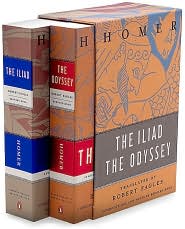Assignments for October 31--November 4

"Homer is the poet of all ages, all races, and all moods. To the Greeks, the epics were not only the best romances, the richest poetry; not only their oldest documents about their own history--they were also their Bible, their treasury of religious traditions and moral teaching. With the Bible and Shakespeare, the Homeric poems are the best training for life."
from Andrew Lang's essay, "Homeric and the Study of Greek"
Monday
Thoughts taken from Homeric Greek: A Book for Beginners by Clyde Pharr
Characteristics of Epic Poetry
Questions and Discussion Points about Book 2
Discussion of Thersites
Tuesday
Continuation of the Discussion of Book 2
Discussion of Book 3
By Now, You Should Know Nearly All the Main Characters
Characteristics of Epic Poetry Quiz
Wednesday
Book 4
Thursday
Book 5
Friday
Book 6
from Andrew Lang's essay, "Homeric and the Study of Greek"
Monday
Thoughts taken from Homeric Greek: A Book for Beginners by Clyde Pharr
Characteristics of Epic Poetry
Questions and Discussion Points about Book 2
Discussion of Thersites
Tuesday
Continuation of the Discussion of Book 2
Discussion of Book 3
By Now, You Should Know Nearly All the Main Characters
Characteristics of Epic Poetry Quiz
Wednesday
Book 4
Thursday
Book 5
Friday
Book 6






